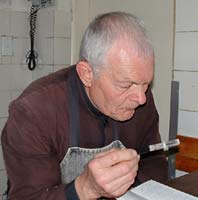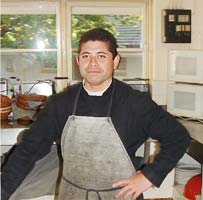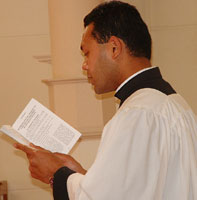|
Religious
Communities for Men
Chapter 6a:
THE
SOCIETY OF ST. PIUS X BROTHERS
Exerpt
from the Southern
Sentinel, August 8, 2003
Newsletter of Holy Cross Seminary
by Fr. Peter Scott
BROTHERS, HEART
OF THE SEMINARY
I would like,
this month, to say a few words about the hidden life of the Seminary,
in every way analogous to the hidden life of Our Lord: sanctified
by humility, regularity, prayer and work. This is the life of the
four Brothers that we are privileged to have here at Holy Cross
Seminary. To many the Brothers pass unnoticed; to us, however, they
constitute the heart of our little community. Their joyful self-effacement,
their punctual and strict observance of the rule, their love of
their prayers, including the extra Rosaries and Stations of the
Cross that are part of their rule, and their commitment to every
aspect of the material life of the Seminary, make them not only
indispensable, but true guardians of the community and of its life
as a whole.
Secondarily,
they have proven to be absolutely essential to the success of our
Minor Seminary. The Brothers live in Mater Dei wing along with the
minor seminarians, and provide constant supervision for them during
recreations and whenever they are not in class, teaching them not
only cleanliness, tidiness, manners and respect for one another,
but also kindness, thoughtfulness and silence.
Brother Joseph
entered the Brothers of the Society in 1984, and made his first
profession two years after, receiving his formation at the then
new priory in Rockdale. He brought his skills as a master builder
with him to the Seminary when he was transferred here last February,
and is responsible for all our numerous building maintenance and
remodeling projects, the most recent being the fixing up of the
Minor Seminary teachers’ staff room.
Brother Peter,
who was born in Calcutta of English parents, entered the Oblates
of Mary Immaculate in South Africa in 1954, making his first profession
in 1955. Having been transferred to Australia in the early 1970s,
the modernism of his order eventually forced him to leave in 1987.
He immediately joined the Brothers of the Society, and after several
years in Rockdale was stationed here at Holy Cross. Brother Peter
has been for the past eight years the Brother in charge of laundry
and cleaning, and the guest master. Last year the position of Seminary
Bursar was added to his responsibilities.
Brother Bernadine
entered the Brothers in March 2000, and received his religious formation
here at Holy Cross Seminary, making his first profession on the
feast of St. Joseph 2002. Until the arrival of our cook he was in
charge of the kitchen. Since then he has been able to try his hand
at different things. He is presently the Retreat Secretary, and
is responsible for the maintenance of our computer database and
mailing list, as well as for our regular mailings. He is also responsible
for the Seminary gardens, grounds, fences and animals, presently
6 steer and 13 sheep. Brother teaches Sunday catechism, as all our
Brothers are taught to do during their formation. He is also the
Brother who spends most time supervising, correcting and edifying
the Minor Seminarians.
Brother Xavier
entered the religious life at the Seminary in March 2001, and is
presently a novice, having completed a one year postulancy before
beginning his novitiate. He will be making his first vows on September
29. He has been working in different aspects of Seminary life since
coming here, but most consistently in the kitchen especially over
the past six months. However, he is presently taking over the laundry
and as guest master from Brother Peter, who will become the cook’s
assistant.
It is to be
regretted that we have not had any postulants to the religious life
since Brother Xavier entered, nor even any applications. It makes
one wonder if our faithful really appreciate the beauty and the
joy of this consecrated life, and how necessary it is not just for
the Society, not just for our priests and seminarians, but for the
life of the Church itself.

|
|
This
view of the four brothers stationed here at Holy Cross Seminary
shows Brother Peter (top left) reading, Brother Xavier (top
right) in the kitchen, Brother Joseph (bottom left) driving
a back hoe rented for work to be done andBrother Bernadine
(bottom right) ready for work, |
 |
|
THE RELIGIOUS IS FREE
One of the
reasons why young men shy away from a religious vocation is the
feeling that the brother’s life is horribly constraining,
that it is made up of unbearable restrictions, that it stands in
the way of being able to do as one wants, that it prevents one from
developing one’s personality, that it stifles all natural
feelings, that it makes one into little better than a slave, that
it takes all the fun out of life and gives very little in return.
Nothing, indeed,
could be further from the truth. Far from hampering personal freedom,
far from holding a man back in a state of puerile dependence, the
religious state has the exact opposite objective, and truly accomplishes
it. It is a state of perfection, in which a man commits himself
to take the means necessary to strive for perfection every day.
This is in fact what makes the religious free, free to make a total
and perfect gift of himself, free from the obstacles of his own
disordered attachments, free to love God, free to place the divine
Honor, Glory and Holy Will over and above every created thing, free
to make of himself “a sacrifice of perpetual praise to the
divine majesty” (Brothers’ profession).
Indeed the
religious who is not a priest has the ultimate freedom, for without
the direct responsibility for others’ souls, he gives himself
entirely to the striving for personal perfection, through the living
of the vows of poverty, chastity and obedience. If the Church presumes
the priest to be free, through his detachment and through his consecration
to God, the religious actually takes the means to become so.
This is why
the religious vocation is radically different from the priestly
vocation, and why the religious is not at all to be considered as
a man who does not have the aptitude for Seminary studies and who
cannot become a priest. His is quite simply a different vocation.
The priest is consecrated to the service of the Church, so that
no man has a right to priestly ordination. This is why it is the
first duty of the Seminary Rector to exclude from ordination any
seminarian who does not have the requisite learning, piety and uprightness
of life. However, every Catholic man has a right to the religious
life, provided that he seeks it for the right reasons, and uses
it to strive for perfection, has no impediments. Furthermore, if
it is true that no religious can be lazy, some are more educated
and others less so. There is absolutely nothing to stop a more educated
Catholic, who is not called to the priesthood, applying to enter
the religious life. Indeed, it would be a great blessing for the
Brothers of the Society to receive as vocations men with academic
degrees, for it would enable the Brothers to play an even more active
role in the education of boys.
THE RELIGIOUS THINKS & MERITS FOR HIMSELF
By practicing
obedience to the rule as to the will of God and to his superiors
as to God’s representatives, the religious in no way loses
his own will, nor do his acts become any less voluntary and meritworthy.
Much to the contrary. For it is by his own generous sacrifice that
he embraces the rule as the will of God, that he joyfully and generously
sees in the commands of his superiors the manifestation of God’s
plan of divine Providence of his life and activities. Indeed, just
as the vow of poverty makes voluntary and meritworthy the religious’
state of possessing nothing of his own, so likewise does the vow
of obedience make more willing and meritworthy everything that he
does. The rule of life, including the divine office, prayers, meditation
and common meals is embraced as the signified will of God, and the
decisions of superiors as God’s will of good pleasure. However,
in both cases the religious knows with absolute certainty the will
of the Almighty, and this gives to his acts and duties a willingness
impossible for those who are wandering uncertain, and often aimless,
amongst the vagaries of the world.
Nor is there
anything childish about the religious’ dependence. It is a
whole and complete abandonment to the will of Almighty God. This
is accomplished through the living of the vow of poverty, which
is nothing less than the generous response to the invitation of
our Divine Savior mentioned in the Brothers’ profession ceremony:
“If thou wilt be perfect, go sell what thou hast, and give
to the poor, and thou shalt have treasure in heaven: and come follow
me” (Mt 19:21). Truly the religious life makes a man free.
Nor is it to
be thought that the religious life somehow discourages a man from
thinking for himself, or making his own decisions. Again, the truth
is entirely the opposite. Obedience is not at all a blind virtue,
and the religious learns to always consider the ultimate reasons
for decisions and duties, as they fall into God’s plan. The
religious is thus trained in the virtue of prudence, namely how
to govern himself for heaven, and how to govern those for whom he
is responsible. This requires the humble seeking of counsel both
from his own spiritual director, and from his superiors; it requires
the ability to make the right judgments as to how to overcome his
faults, bad habits and disordered attachments, as well as to fulfill
his duties; it requires, finally, follow-through, or the ability
to execute both with respect to his own spiritual duties and with
respect to his responsibilities for the apostolate and for the community.
These are the three acts of prudence that the brother must be trained
in, as a thinking man, without which he cannot be faithful to his
vocation.
THE JOY OF THE RELIGIOUS
The practice
of poverty and detachment, of willing and obedient submission, necessarily
presupposes a community, in which the religious lives, along with
superiors and fellow religious. A community is both a mortification,
as is any family life, but also and especially a great treasure,
for it is a supernatural family that shares its life together. The
community is indeed an incomparable consolation for the religious
who has vanquished his self-centeredness.
Archbishop
Lefebvre had this to say about the brothers’ living of community
life, when he wrote their rule: “Let the Brothers make efforts
to manifest in the community their profoundly religious spirit,
one of silence, of union with God, of fraternal charity, of zeal
to give service to others, but without neglecting the service of
God. May all those whom they approach, and all those in the midst
of whom they live, be edified by their behavior, and never disedified.
Let them be like the guardian angels of our communities.”
(§20).
There is certainly
nothing inhibiting in such an ideal, nor could there be anything
sad, depressing or lonely about a community of men who share together
the same magnanimity, who live side by side the absoluteness of
self-sacrifice. Indeed, if natural family life is enjoyable and
consoling, how much more is the supernatural family life that is
open to the man who has willingly offered up the passing natural
joys of this earth for the unchanging ones that will never perish.
This is powerfully impressed upon the soul by the following counsel,
also contained in the Brothers’ Rule, namely that the brothers
“strive to understand the profoundly supernatural nature of
this life…May they find in this conviction and in this reality,
more heavenly than earthly, their unchangeable joy, their unceasing
consolation, their steadfast serenity.” (§4 & 5).
MANLINESS IN THE RELIGIOUS
The modern
world holds the mistaken idea that the man who is willing to make
the vow of perpetual chastity is somehow lacking in virility, that
he is less of a man, that he hates women, or is someone who finds
it difficult to love, or who refuses to take the responsibility
of supporting a family. Again, nothing could be further from the
truth. Such a person, not a real man, could never be a candidate
for the religious life. Furthermore, manliness is not just a prerequisite
of the religious life, but the religious formation positively strives
to develop and perfect it. Grace does not suppress nature, nor does
the religious life suppress the manly desire to support, help and
cherish the weak, especially the sick and the elderly, women and
children. But it does purify it from all disordered or self-centered
attachments, and it does encourage the elevation of the sensitivity
by the appreciation of art, music and beauty, starting with the
Liturgy and the Gregorian Chant, in which all the Brothers are trained.
Modern psychology
uses the term sublimation, for what it describes as a psychological
process, without understanding any of the reality, considering it
to be but the substitution of one emotion or interest, in order
to make up for the lack of another. However, in the etymological
sense of tending towards the sublime, it is eminently true of the
religious life. Far from suppressing natural feelings, life in community
and the vow of chastity indeed elevate them to a much higher plane.
They are not substituted for, but purified from the selfishness
so easily inherent in purely human relationships. The religious
is indeed indifferent with respect to himself, but he cannot afford
to be with respect to others. He must have a true concern, affection
and care for the members of his community, as for all souls with
whom he enters into contact.
Thus a Brother
is in no way unmoved by suffering and hardship. To the contrary,
he is very familiar with it, thanks to his constant meditation on
the Passion of Our Divine Savior. Without in any way denying the
reality of human pain, he will constantly strive by his words and
example to encourage others to sanctify it, by offering it up in
reparation for their sins, and in union with our Divine Savior on
the Cross. His human feelings find their perfection in their union
with those of Our Lord. In this he learns to scrupulously avoid
all particular friendship, destroying as it does any true community,
and undermining his ability to imitate Our Lord, who loves all without
exception, “who will have all men to be saved, and to come
to the knowledge of the truth” (I Tim 2:4). Sublimation it
is, if by this is meant the lifting of the natural affections to
the sublime affections of God truly made man, the bearing in one’s
heart if His own love of truth and beauty and of His hatred for
the ugliness of sin.
However, it
is especially in the formation of a sense of responsibility that
this manliness consists: - responsibility for one’s own soul,
for one’s spiritual family, for edifying one’s neighbor,
and here in the Seminary for the edification of the priests and
major and minor seminarians. This sense of responsibility is characterized
in particular by the manly moral virtue of fortitude, manifest in
the strength of character of the mortified religious. The brother
constantly emulates the martyrs, who lived this virtue to perfection,
for the religious life, a constant dying to oneself, according to
the words of St. Paul “I die daily” (I Cor 15:31), is
a ongoing martyrdom, as said St. Anthony of Egypt, disappointed
when he could not endure the martyrdom of blood. This manly fortitude
is manifest in his striving for perfection in the ordinary duties
of state of every day.
WHO IS CALLED?
I think, then,
that it is clear what kind of men God calls to the religious life.
It is not the weak, inconstant, effeminate who cannot make a go
of it in the world, who do not have the desire to marry and raise
a family. No, God calls to the religious life strong, virile, responsible
men; men whose feelings, convictions and passions are firm and unshakable,
yet under control; men who would like to raise a family if it were
the will of God; but men who would like much more to consecrate
themselves to His service, to His honor and Glory if this is the
will of God; men who would much prefer to joyfully and willingly
“humbly ask for the favor of consecrating myself totally to
God the Holy Trinity, to Our Lord Jesus Christ and to the Holy Church
by the three vows of religion” (Brothers’ Profession).
God is seeking for those truly prudent men who are willing to devote
all the energy of their manhood to striving for perfection, to the
practice of the holy virtue of religion.
Please pray
that the Lord of the harvest might deign to send such men to us
here at Holy Cross Seminary, that the glory of the religious life
might continue to grown and shine in our midst, as the Church prays
in the Votive Mass for religious vocations: “We beseech Thee,
O Lord, to graciously look down upon Thy family and to always augment
it with new offspring: that it might guide its sons to the sanctity
after which they aspire, and that it might effectively bring about
the salvation of others. Through Our Lord Jesus Christ…”
Yours faithfully
in the Most Holy and religious Family,
Father Peter
R. Scott
The Rector,
Holy Cross Seminary
P.O. Box 417
Goulburn NSW 2580
Australia
Tel: [61] 48-295
177
|


![]()
![]()



